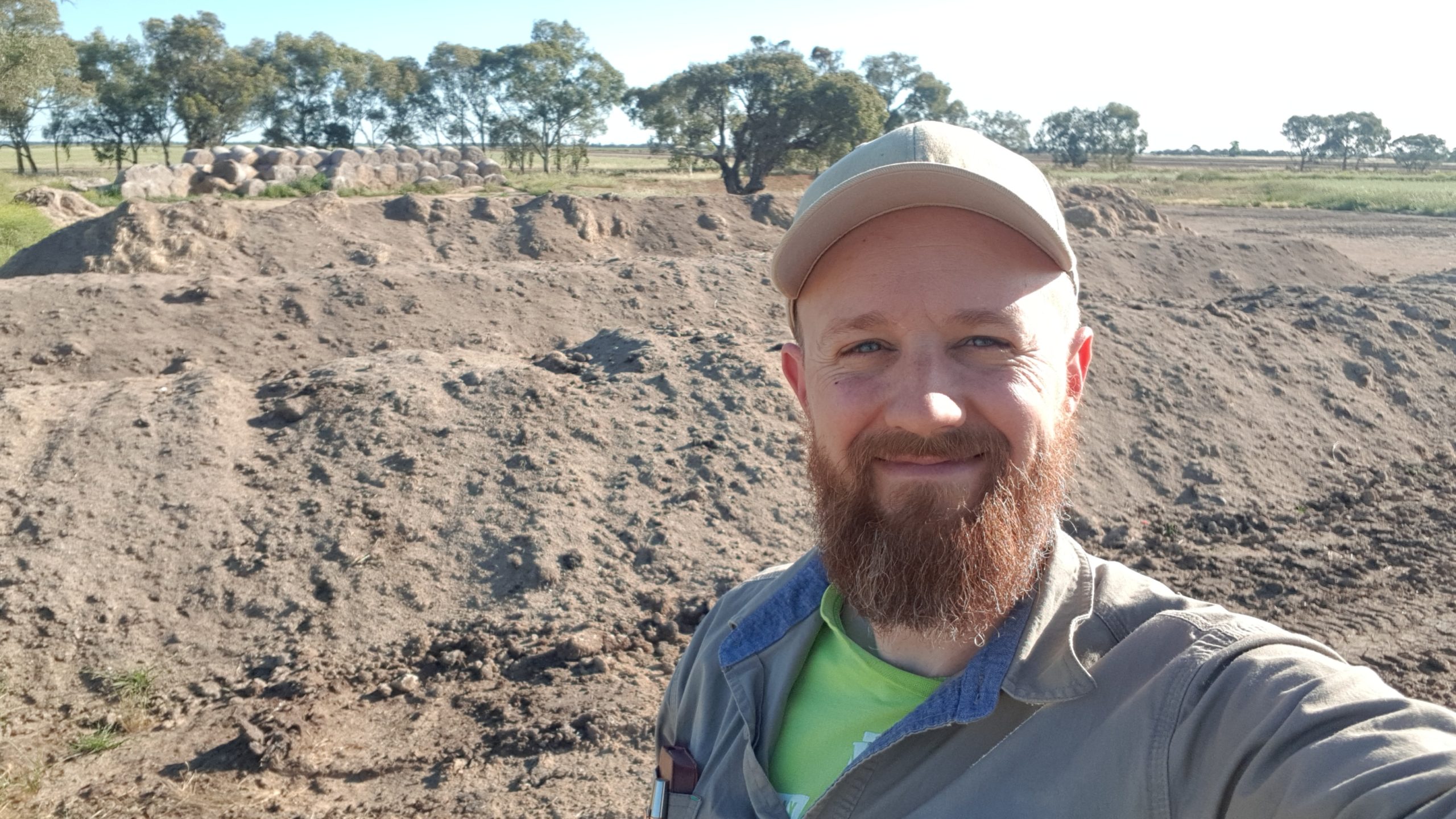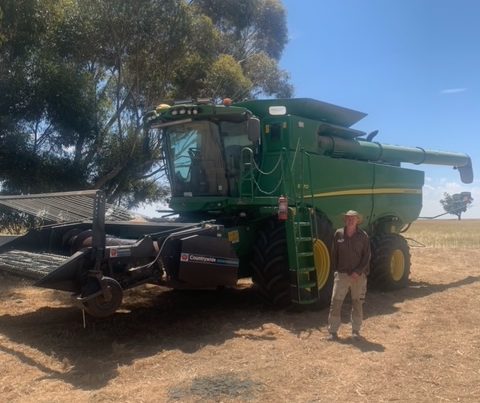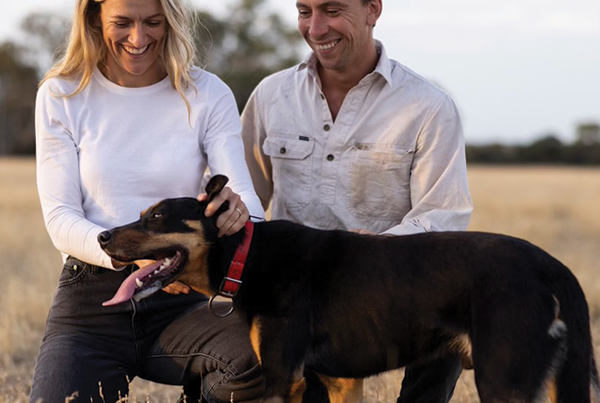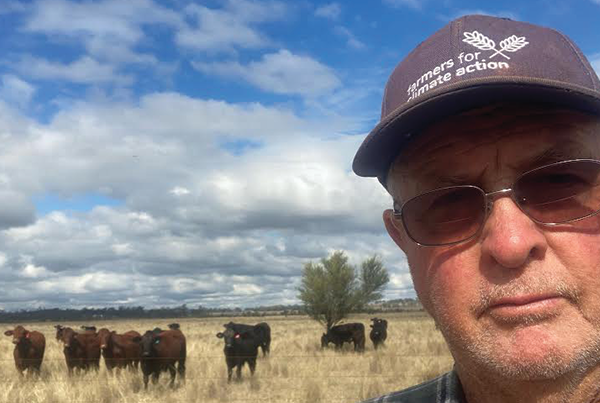At a glance
Who:
John Barton, 4th generation farmer and 1st generation composter. Joint owner of Charton & Bang, a soil health product company. Charton & Bang make the CarbonRich line of products – www.carbonrich.com.au
What:
Running a commercial composting operation to produce high quality compost for agriculture. Located on the family farm, with around 600 hectares of irrigation country producing rice, wheat and prime lambs.
Where:
Murrami (Near Griffith NSW)

Photo: John Barton
Can you tell us about your property?
I own the compost producing company with my Aunt and another business partner. We make up to 4,500 tonnes of compost per year from agricultural wastes such as rice straw (usually burned in the paddock), cotton trash and chicken manure. We have just started production of a liquid extract from compost. We hope to produce 500,000 litres a year.
We work under the philosophy that anything we do has to be as sustainable as possible. This includes using wastes as ingredients, aiming our products at climate resilience and nutrient sustainability, and minimising energy use. This is balanced with practicality. If we have to use diesel for energy in the short term or make other temporary compromises, we will as long as there is a pathway towards sustainability. It’s no good refusing to take positive actions because we can’t be perfect.
What first got you thinking about climate change?
I first learned about climate change in the late 90s through reading about science. As soon as I learned about impacts on water, with higher temperatures meaning higher evaporation, less rainfall for some areas, and shorter, more intense rainfall for all areas, I saw the potential impact on farming. Water is obviously critical to food production, and we were going to find it harder to get water into the soil from short sharp rainfall, and then we were going to lose it more quickly through increased evaporation. I could see yields dropping away as soils dried out between rainfall events. Ever since then I’ve been looking for strategies to adapt to climate change, including native food plants and kangaroos, but I ended up stepping sideways from being a farmer and working with compost as one of the most effective ways to build and maintain soil carbon and soil water.
How has climate change impacted your farm business?
The prospect of unreliable irrigation water with climate change led me to look elsewhere from the family farm for other types of farming. I tried a lot of other jobs in and out of farming (21 jobs by the time I was 27) before a major back injury and surgery made me rethink the idea that I could own and run a farm myself. I went to university as an adult and studied horticultural science, with a particular focus on farm ecology and soils. During that time I met a commercial composter who offered me a job. I researched compost and came to the realisation that composting to produce stable complex carbon that has largely been lost from agricultural soils was incredibly important. This carbon can be stored long term in the soil in the right conditions, and gives a wide range of benefits (particularly increased soil water storage) that can help farming adapt to climate change. 13 years later I have my own business producing compost and helping other farmers to climate proof their operations.
What are some of the climate-smart strategies you’ve been employing and how successful have they been?
Compost is one of the most effective actions you can take towards building soil carbon. Unfortunately there are financial and practical barriers to farmers using compost. Good quality compost is expensive to purchase per hectare, and also bulky and therefore expensive to transport. You then need a front end loader and the right type of belt spreader when you do get it to the farm. It is nearly always worth the effort, but it can be a scary investment in time and money. To lower this barrier, we have developed a liquid extract from compost. It can go on at much lower rates (15 litres per hectare vs tonnes per hectare) and therefore costs less per hectare and much less to transport. With longer transport distances factored in, liquid extract can be 100 times cheaper than compost, addressing the financial barrier. Our experience so far is that you get a similar soil health and climate resilience response. The extract can go through boom sprays, direct injection, drip irrigation or overhead sprays. It can be mixed with fertilisers and some chemicals that may already be planned for application. This solves the practicality barrier of needing special equipment and extra labour required to do more operations.
I also use my knowledge to help explain complex soil concepts to farmers in simple ways with practical applications. I run courses, present at field days, give webinars and I’m currently working on a YouTube channel. It’s hard to find to find information with a regen ag and climate focus that is both science based and practical on farms. It’s fine to talk about an idea that may have great climate outcomes for farmers, but if it takes too much labour, can’t be done with existing machinery, can’t be done with readily available inputs or just costs too much per hectare you’re asking too much.
Do you use renewable energy on your farm? What are the benefits?
Currently almost all of our energy use goes into diesel for machines. We can’t yet afford to electrify our compost production and so renewable energy hasn’t been a priority. As the business grows and diversifies we will use anaerobic digestion as part of our processes and use byproducts from that which can run generators to produce renewable energy. As soon as we have enough spare profit that isn’t immediately needed for upgrading equipment, we plan to invest in solar. We don’t want to be reliant on any form of net carbon emitting energy for a second longer than we have to.
If you could send a message about climate change to the Federal Government what would it be?
Just get on with it. The future impacts are already here, the technology exists and the benefits are clear. Just get on with it.






